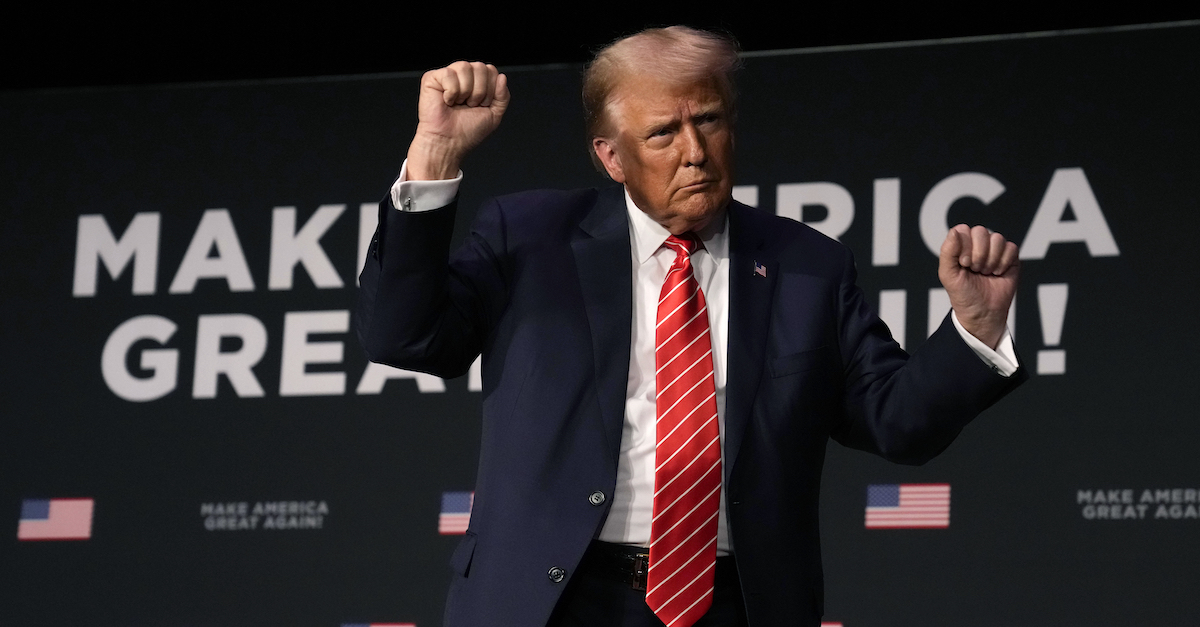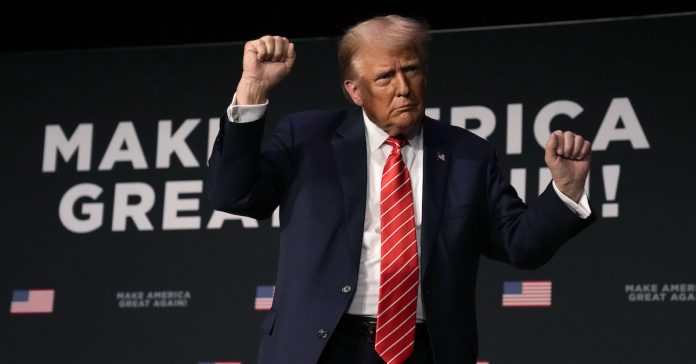
Former President Donald Trump dances on stage during a commit to caucus rally, Sunday, Oct. 29, 2023, in Sioux City, Iowa. (AP Photo/Charlie Neibergall)
The Michigan Court of Appeals on Thursday affirmed two lower courts’ refusals to remove Donald Trump from the Republican primary ballot under the 14th Amendment’s insurrection clause, writing that “there is no potential error” to correct at this stage.
The appellate ruling concerned two cases, one filed in the Wayne Circuit Court and the other in the Michigan Court of Claims, on behalf of voter Robert Davis (who sued the Wayne County Election Commission), and voters Robert LaBrant, Andrew Bradway, Norah Murphy, and William Nowling (who sued Michigan Secretary of State Jocelyn Benson).
“There is no support for Davis’s contention that the Wayne County Election Commission is authorized to independently determine whether Trump is disqualified under the Insurrection Clause and then refuse to authorize ballots including him as a candidate on that basis,” the Court of Appeals said, before jumping into the relevant statutes to conclude “there is no potential error to be corrected”:
In other words, MCL 168.567 is a mechanism by which boards of election commissioners must correct errors in ballots that are later found. Nothing in the plain language of the statute suggests or implies that it creates a duty to investigate a highly fact-intensive matter of constitutional law such as is presented by the instant case. Neither does MCL 168.689. And, as will be explained next in further detail in the following sections of this opinion, by placing Trump on the presidential primary ballot, the Secretary of State would be following her statutory mandates. Thus, there is no potential error to be corrected under MCL 168.567.
The state appellate panel added that “it is unnecessary to make any determinations regarding whether Trump engaged in insurrection or is actually disqualified from holding the office of President of the United States by the Fourteenth Amendment, at least at this time.”
In November, the Minnesota Supreme Court similarly concluded that there was “no error to correct here as to the presidential nomination primary,” but left the door open for potential general election disqualification.
The Michigan Court of Appeals referenced the Minnesota decision to explain its reasoning that Trump cannot be removed from the primary ballot under the insurrection clause.
“But, like the Minnesota Supreme Court, we conclude that there is no error to be corrected concerning the presidential primary ballots because the Secretary of State must place Trump on this ballot, regardless of whether he would be disqualified from holding office by the Insurrection Clause,” the court said.
More Law&Crime coverage: Colorado Supreme Court appears split on whether Trump can remain on ballot
The appellate court also said that Secretary of State Jocelyn Benson, a Democrat, has “virtually no discretion” on the issue of which Republican candidates can appear on ballots for “internal party elections.”
“The Secretary of State, rather, follows the directions of the political parties and the candidates themselves. The Secretary of State is obligated to place on the presidential ballot those individuals identified by the political parties, unless a candidate files an affidavit saying otherwise,” the court wrote. “Nothing in this framework exhibits any decision-making to be had, at least by the Secretary of State.”
Again, like in the Minnesota case, the Michigan courts concluded “it would be improper to decide whether to grant a declaration that Trump is disqualified from holding the office of President of the United States at this time”:
At the moment, the only event about to occur is the presidential primary election. But as explained, whether Trump is disqualified is irrelevant to his placement on that particular ballot. Thus, with respect to the presidential primary election, there is no actual controversy, as the only purported basis for removing Trump from the presidential primary ballot would not be a sufficient basis for removal of Trump’s name from that ballot.
A footnote at the end of the Michigan Court of Appeals decision pointed out that the court did not “address the Court of Claims’ conclusion that the question of whether Trump is disqualified by the Insurrection Clause is a nonjusticiable political question.”
But in an earlier footnote, the Court of Appeals seemed to tip its hand:
While the Court of Claims specifically referenced the presidential primary ballot, we perceive no reason why the Court of Claims’ decision would not apply equally to plaintiffs’ claims concerning the general election ballot or beyond.
The footnote was referring to the Michigan Court of Claims holding that the insurrection clause challenge raised a nonjusticiable political question. When a federal judge in New Hampshire tossed out a 14th Amendment case in October, he also wrote that the plaintiff had raised “a nonjusticiable political question” that the “court would lack jurisdiction to hear […] under the political question doctrine.”
Though the Michigan Court of Appeals made a point not to “address the Court of Claims’ conclusion that the question of whether Trump is disqualified by the Insurrection Clause is a nonjusticiable political question,” they may be inclined to do so at a later date.
Read the Michigan Court of Appeals opinion here.
Have a tip we should know? [email protected]

